- Home
- Conn Iggulden
The Gates of Athens
The Gates of Athens Read online
Prologue
The dust of mountain flowers lay thick on the air, like perfume or boiled varnish. Living things panted in the shade. Goat’s-thorn grew on all sides, with scrub grass and bare rocks too hot for anything alive to rest upon. Crickets creaked and sang in the branches of pines that clung to stone and somehow endured.
Into a stillness as old as the hills around them music sounded as a faint thread on the air, swelling into something that rang with brass and voices raised in song. Lizards scuttled out of sight as the king’s dancers reached the crest, making the air tremble with cymbals, pipes and drums. At a single order, they halted, panting, dripping with sweat.
The king himself came forward on his stallion, dismounting with a hint of the grace he had known as a young man. Darius tossed the reins to a slave and clambered onto a huge flat stone to stare over the plain. From that height, he could see the scars of the land, the marks of war and fire. He frowned, moved by both the distance and the closeness of the past. He had stood in that same place thirty years before. In that moment, it seemed as if he could take a single step and be there once again, with his father at his side and his life all ahead.
Ruins lay where the city of Sardis had been. The flames had died down long before, though when a whisper of breeze rose, Darius thought he could smell char on it, a scent of burned bricks or perfume, or rot. There were people too, in the distance. The air was so clear, Darius could see the sparks of cooking fires, with thin trails of smoke rising above. No doubt some of them had run, only to return when the conflagration had died down, or perhaps they had come to loot the ruins, searching for beads of gold that had once been coins.
The funeral pyre of a city could never be a small thing. On that day, from the height and distance of the mountains, it was hard to imagine entire streets and parks and districts consumed in flame. The watchtowers along the great wall had fallen, Darius saw, spilling their stones. Roads too stretched away from the walls, clearly marked. The steps of families had carried ash and soot, making dark trails like the veins in an old man’s arm. The king knew pestilence would stalk there now. Those who had survived cared nothing for the dead, not without leadership. Flies crept over corpses – and the living hurried past, desperate not to see.
The Great King did not wince or shake his head at the thought. He had known death before, many times. He knew his workers would have to bury the fallen in vast shallow pits outside the city before they could even begin to rebuild.
Darius turned at last, looking to include his young son in his deliberations. Xerxes sat some way back from the front ranks, one leg tucked beneath the other as he balanced on the shoulders of a young bull elephant. Darius saw the boy was distracted by something, perhaps one of his pets. Xerxes could always find some creature to train and amuse him. The most recent had been a cricket, the one before a tiny blue lizard that held food in both hands to devour it. The Great King had never felt the need for such things himself. He worried the boy was not concerned enough with the empire he would inherit. He sighed. The cares of a father were legion.
The royal procession had come to a halt at his gesture. Having climbed steadily all morning, relief shone in their faces. Behind the king stood sixty thousand men, back and back, reaching so far down the trail he could not see an end to them. Darius had come prepared for war, but found only ashes.
Ahead, the dancing women rested, quivering in their exhaustion. One of them had fallen just that morning, dropping to the ground in loose-limbed delirium, then shrieking as carts and men behind passed over. Only the royal elephants had stepped around the broken girl, fastidious in what they chose to crush.
Darius knew he didn’t have to say a word to his seneschal. Ashar’s grim countenance and faint blush was evidence enough of his shame. The mistress of the dancers would certainly be beaten that evening, perhaps bound to a tree and simply left, for lions and wolves to find. The others would see her fate and know not to shame the Great King in the honour he did them.
Darius was no longer the vital young warrior he had once been. As he contemplated climbing down from the rock, he suppressed a wince at the twinge in his hips and lower back. There was a time when he would have leaped down, delighting in his strength. His servants knew him well, however. Steps had been brought as he’d stood and looked out. He walked down then, back straight, his expression perfectly calm.
Xerxes watched warily as his father approached, wondering if he would be punished for something only the king could possibly have noticed or cared about. Seated on a pad of stuffed silk, the boy wore just sandals and a kilt of leather studded in gold. Bare-chested, he was a living reminder of youth that could only sour his father’s mood further.
Servants sprinkled dried lavender and myrtle on the dusty path as the Great King approached his son. It was an insult for Darius to be made to look up, but Xerxes seemed frozen in his seat high on the elephant. The enormous young bull swung its head to eye the man at its side. Both boy and beast were at the most awkward of ages. With a gesture, Darius waved the petal servants away. They trembled on the edges of his vision, ready to make the ground fragrant once more, for steps that shook the world.
‘Come down from there, Xerxes,’ the Great King said softly.
His son nodded and put out one hand so that his elephant could see. The trunk curled round and he stepped onto the muscled length, brought to the ground in perfect smoothness. The boy seemed proud of it. Darius showed no reaction to a trick more suited to the markets or the logging camps. He put his arm around his son’s shoulders and walked with him to where he should have been standing, waiting on his father. There, Darius rested one hand on the great stone, feeling its warmth.
‘You see that city?’ he said. ‘Dark with ash?’
Xerxes made a show of peering in the distance before he nodded, still unbending. Darius found he was proud of the young man who would surely follow him, if Ahura Mazda, the Lord of Wisdom, allowed it. It did not pay to be too sure of the future, aloud or in the most private thoughts. The God of Light heard all.
‘It is Sardis, the capital of this entire region,’ he said. ‘Or it was. It was sacked by an enemy and burned, including the great temple that had stood for two thousand years. This is why I brought so many soldiers, Xerxes. By tomorrow, every home and temple will be cleared to the foundations. We will rebuild it all.’
‘Who would dare attack one of our cities?’ Xerxes asked.
‘Men of Athens, men of Eretria,’ his father replied. ‘The Greeks. I thought… They sent ambassadors here a dozen years ago, asking for friendship. I thought they had agreed to become one of my chosen – my beloved subject peoples. They gave earth and water to my governor and they went home, across the sea. I confess I hardly thought of them after that.’
The king smiled and tried to ruffle his son’s hair. He hid his hurt when Xerxes pulled away.
‘This is the edge of the world, Xerxes. The sea lies not two days from here – and beyond it, lands which have never known the blessing of our laws, our soldiers.’ He waved an arm over the plain. ‘I rule here, from the slave markets to the gold mines. Every pot and cup is mine, every coin and beam and child. Yet we are a long way from civilisation, from the heartlands. Perhaps I have been too gentle with them, too forgiving. I trust too easily. It has always been my weakness.’
He saw his son shift uncomfortably and smiled.
‘No man can say I am without honour, Xerxes. Can you accept that? If I give my word, I keep it, though the world falls around me. If I forgive an enemy, if I welcome him as a child into my house, he knows there will be no more anger from me. Even the Greeks know this. Oh, they may shout and struggle, but for those who are men, who are willing to put aside their pride and offer me tokens of
earth and water, I will be always a forgiving god.’
‘But why? Why would you forgive the men who did this, who burned Sardis?’
Darius leaned closer to his son. Though a hundred servants and slaves waited on his slightest whim, though two naked and kohl-eyed women peeped from the curtained litter that adorned his elephant, he was alone still, with his heir.
‘I speak now as a king, Xerxes. Hear me. My word is unbroken because when a man takes the field against my armies, I want him to look in fear on his allies, to wonder if they will desert him, even in the heat of battle. I want him to know, as he knows his own name, that if he surrenders to me, if he takes the taste of dust onto his lips and offers me water from his cupped hands, I will honour him as an ally to the end of the world, without rancour, without vengeance. Because he will be a living example of my mercy. Do you understand?’
Xerxes shook his head a touch, closing his eyes as the wind picked up, easing the great heat of the day. In that moment of silence and peace, he suddenly saw it. His eyes opened and his father smiled to see the gleam in them.
‘Trusting you weakens them all…’ Xerxes said, in something like wonder. ‘It means brother will turn on brother as we approach, friend against friend. But the cost, father? To your honour? You lose vengeance – is it not too high a price to pay?’
‘No. There are forty nations in my empire – Media, Assyria, Lydia, India – by the god that binds, men like silver fish in the ocean, all subject to my throne, my crown. If I were a trickster, a liar, they would have fought much harder to keep me away. Instead, their leaders are given palaces and lands. In their quiet times, they might wonder if they have been conquered at all.’
‘But they have,’ Xerxes said.
His father nodded.
‘Yes. So it is with these cities, this “league of Ionia”. They look to their forefathers the Greeks instead of us. Perhaps they thought I was too far away to care what they did on the very borders of the western seas. They called to Athens for help in their betrayal – and those Greek whores sent ships from Eretria and their hoplite soldiers to roam this coast, to murder and terrorise peoples that are mine. They talk now of throwing off the yoke I have placed on them, of the “outrage” of our rule.’
The king laughed, though there was little humour in it and his eyes remained black and shadowed by his brows.
‘In the destruction of my garrison, the Greeks set the reed roofs of Sardis aflame. It spread like the wind itself until all was consumed, even the temple to Cybele, Great Mother of the World. That is hard to forgive.’
The king stood looking into the distance for a time. His son did not dare interrupt his thoughts. Nor did he resist when his father placed a hand on his shoulder again.
‘I will rebuild for a season here. The armies I have brought will enter all the towns and cities of this Ionian league and exact punishments as I see fit. They will take men’s hands, so they cannot carry a spear or blade again. The most beautiful children will find their way to our markets. The old men and women will be thrown on the fires. I sometimes think that is a mercy in its way – to those who would have been burdened by them. You see? Even in the furnace of my anger, there can be wisdom. I am no tyrant, Xerxes. When I move, when the mountains move, it is a trembling greater than the tread of a thousand kings. You will know the same, when I am gone. All men are slaves; all kings are slaves to us.’
His son’s face lit with pleasure at the words. Xerxes reached up with his left hand and touched the fingers resting on his bare shoulder. His father’s wisdom had built an empire of such extraordinary wealth and power, it was as he said: the world bowed to him. Xerxes thought even the rain would fall at his command.
‘And what of the Greeks, father?’
‘They have gone back in their ships, like children asleep in innocence. They have butchered my garrisons, after all. They believe the work is done. They are mistaken. The work has begun! I will see them again, when I am finished here.’
The king looked over his shoulder to the ranks of his bodyguard standing in white panelled coats. The heat must have been oppressive, but they stood in perfect stillness, as if carved from stone. The general who commanded them came forward at that single glance, prostrating himself full-length and raising both hands to his eyes as he lay on the ground, as if blinded. When he rose, dust stuck to the oil of his equipment, giving him the air of a soldier on campaign rather than mere ornament. Darius thought it was a fine omen.
‘Fetch me my bow, General Datis.’
The royal weapon was unstrapped from its case and strung in instants, while the king stood with his hand outstretched. Darius accepted the weight of it, a weapon almost as tall as he was himself, though it shone with oil and sunlight on the gold bands wrapping the grips.
‘Arrow,’ Darius said.
He fitted one to the woven string and drew as easily as any man who had practised every day since childhood. The muscles on his arm, shoulder and chest grew taut and he let it fly into the distance, soaring for an age as the ground dropped away to the plains below.
‘I send this shaft as my vow,’ Xerxes heard his father murmur. ‘God, let me punish the Athenians as they deserve.’
He handed back the bow and crooked a finger to his wine slave. Though the slender young man had served the king for all his twenty years, earning authority in the golden court, he dropped to his belly without hesitation, sensing his master’s mood.
‘Mishar, you have a new task, from today. Rise now and accept it from my hand.’
The eunuch rose smoothly, standing with eyes downcast as father and son regarded him. His silks had not fared well on the dusty ground and Xerxes grimaced at patches of sweat. There was no excuse for poor standards, not when there were slaves to bathe and change a man’s robes, as many times a day as he could desire. If Mishar was even a man. Xerxes had made the guards hold him down once, so that he could examine the old injury and the shrunken little sack there, dark as a bruise. Mishar had wept like a woman then. It was odd that a slave might understand his life was not his own, yet expect to keep some semblance of dignity – a part owned as surely as the labour of his hands! Xerxes thought his father allowed some of the servants too many liberties, perhaps through long association. He would not make the same mistake when his turn came. He smiled at the thought.
‘Mishar,’ the king went on, ‘you are to approach me each evening, as I sit for dinner. You will interrupt me, without fear of punishment. You will say this: “Master, remember the Greeks.” Do you understand what I have said to you?’
The wine slave tried to nod, though he trembled so violently Xerxes thought he might be ill. Mishar too had noted the black ruins of Sardis. He had not known how the king would react. A trickle of sweat showed as a bright line on his forehead, slipping into the creases by his painted mouth.
‘I… I do… I understand, Majesty. It will be as you say.’
‘It will indeed, Mishar. If you forget, I will have that fine tongue I own torn out. Now leave us – and find fresh silks. Those you are wearing are fit only for the fire.’
The eunuch bowed and dipped away. Xerxes watched his father in anticipation, seeing the wolf in him, the destroyer of nations.
‘So,’ the king said, ‘I will not forget the debt I owe the Greeks, my son. Not until it is paid a thousand times over. They are a small and scattered people. I will purchase ships from the Phoenicians and march some of my lazy western garrisons to this place. There are too many palace officers here, Xerxes, men fat and soft, living lives of ease. A little campaign would do them good, I think. Perhaps I will see how my Immortals fare on the open sea. It would amuse me to watch men like General Datis heaving their breakfast over the side!’
The king laughed at the thought, his grim mood vanishing. He turned to his son and Xerxes managed not to flinch.
‘Now, have your horse brought up. I would see you ride out with the scouts as we reach the plain.’
‘I would prefer…’
&nb
sp; ‘It would please me, Xerxes,’ his father said softly.
The boy bowed his head immediately.
‘Very well.’
With that settled, the king smiled.
‘Good. The men should see you ride. When the sun sets, I will expect you at the feast for my officers. My generals and I will make plans to punish these Ionian cities who quake before us.’
Xerxes bowed once more. He had hoped for some time to himself, without his father directing every hour before sleep. Still, the rewards for his obedience would come. Though he could not imagine a world that did not have his beloved father in it, one day, the empire would be his. His command would turn the clouds back then, or dim the sun in his father’s memory. It was a good thought.
PART ONE 490 BC
1
Xanthippus stood very still, breathing through his nose, murmuring instructions to the slaves working around him. The three men responded with slight dips of their heads, intent on their tasks. All of them had served his wife’s family since childhood. A stray thought came to him that every Spartan had seven slaves whose task it was to ready him for war. Perhaps Athenians were more efficient. Xanthippus neither smiled, nor voiced the thought aloud. His mood was restless, impatient. He was thirty-eight years old and he knew he might die that day.
He could no longer hear the uproar in the city, though he doubted it had lessened. His wife’s home was huge, an estate with olive and fig orchards. The room where Xanthippus stood to be armed was right in the centre, far from outer walls that would not have disgraced a fortress. Columns of white stone ringed a central space around him, open to the blue sky above. There was peace there, far from the tumult and fear of war. Around that quiet heart lay a dozen rooms on two floors. Past the outer wall, the house gates opened onto the road to Eleusis, standing to the north-west of the centre of Athens.
Xanthippus had been woken by shouting in the darkness, long before the sun had risen. Runners from the house had been sent into the Agora, to the bronze statues of heroes that represented the ten tribes of Athens. The council of the Areopagus had mounted sheets of fine papyrus there, under each statue. Slaves with torches stood to lend a flickering light to anyone who needed it. Every tribe was called, every deme of the city and the lands around. All they feared had come.

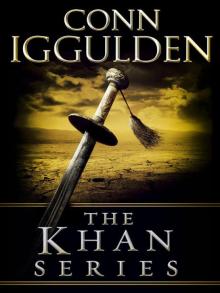 The Khan Series 5-Book Bundle
The Khan Series 5-Book Bundle Tollins 2: Dynamite Tales
Tollins 2: Dynamite Tales Tollins: Explosive Tales for Children
Tollins: Explosive Tales for Children The Field of Swords
The Field of Swords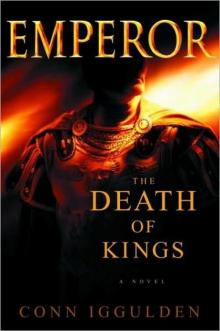 The Death of Kings
The Death of Kings Quantum of Tweed: The Man With the Nissan Micra
Quantum of Tweed: The Man With the Nissan Micra Bones of the Hills
Bones of the Hills Genghis: Birth of an Empire
Genghis: Birth of an Empire The Gates of Rome
The Gates of Rome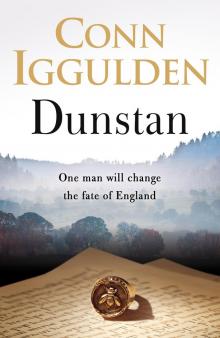 Dunstan
Dunstan Fig Tree
Fig Tree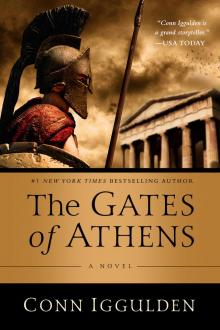 The Gates of Athens
The Gates of Athens Stormbird
Stormbird Khan: Empire of Silver
Khan: Empire of Silver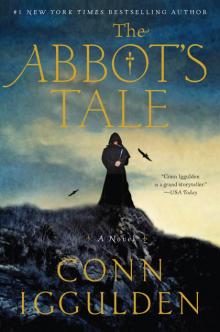 The Abbot's Tale
The Abbot's Tale Gengis: Lords of the Bow
Gengis: Lords of the Bow The Gods of War
The Gods of War Blackwater
Blackwater Ravenspur: Rise of the Tudors
Ravenspur: Rise of the Tudors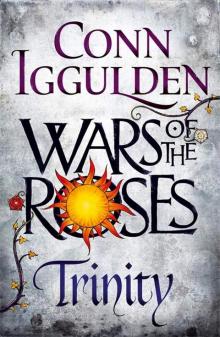 Wars of the Roses: Trinity (War of the Roses Book 2)
Wars of the Roses: Trinity (War of the Roses Book 2) The Gods of war e-4
The Gods of war e-4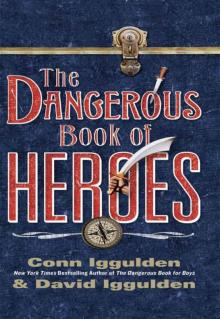 The Dangerous Book of Heroes
The Dangerous Book of Heroes Stormbird wotr-1
Stormbird wotr-1 Emperor: The Death of Kings
Emperor: The Death of Kings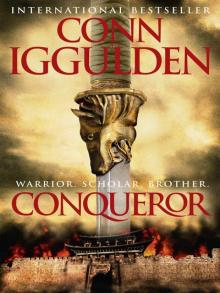 Conqueror (2011) c-5
Conqueror (2011) c-5 The Dangerous Book for Boys
The Dangerous Book for Boys Genghis Lords of the Bow
Genghis Lords of the Bow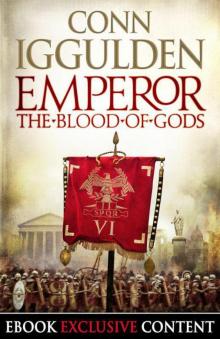 Emperor: The Blood of Gods (Special Edition) (Emperor Series, Book 5)
Emperor: The Blood of Gods (Special Edition) (Emperor Series, Book 5) The Emperor Series: Books 1-5
The Emperor Series: Books 1-5 Lords of the Bow c-2
Lords of the Bow c-2 Lords of the Bow
Lords of the Bow Quantum of Tweed
Quantum of Tweed Wars of the Roses 01 - Stormbird
Wars of the Roses 01 - Stormbird Empire of Silver c-4
Empire of Silver c-4 Birth of an Empire
Birth of an Empire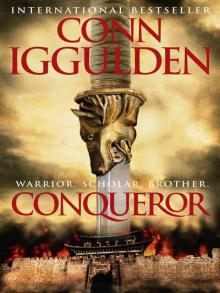 Conqueror (2011)
Conqueror (2011) Wars of the Roses: Bloodline: Book 3 (The Wars of the Roses)
Wars of the Roses: Bloodline: Book 3 (The Wars of the Roses) Bones Of the Hills c-3
Bones Of the Hills c-3 Empire of Silver
Empire of Silver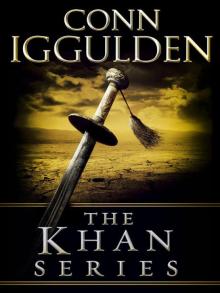 The Khan Series 5-Book Bundle: Genghis: Birth of an Empire, Genghis: Bones of the Hills, Genghis: Lords of the Bow, Khan: Empire of Silver, Conqueror
The Khan Series 5-Book Bundle: Genghis: Birth of an Empire, Genghis: Bones of the Hills, Genghis: Lords of the Bow, Khan: Empire of Silver, Conqueror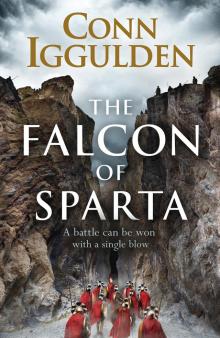 The Falcon of Sparta
The Falcon of Sparta Explosive Tales for Children
Explosive Tales for Children